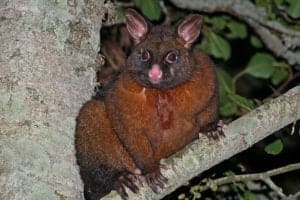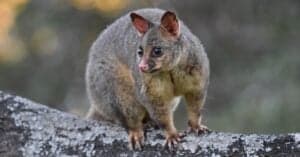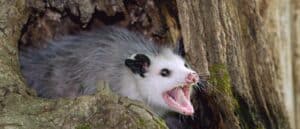When the days grow shorter and the evenings grow darker, you may feel like curling up under a blanket and sleeping away the winter. If you do, you’re not alone! The natural world is full of animals who enter the extreme low-energy state of hibernation to make it through the winter months. However, for them it’s not just a matter of preference, it’s a matter of survival. Possums, like any other animal, face the bitter cold and food shortages of winter. Do possums hibernate in winter to deal with it? And if so, how do they do it? Read on to discover the answers!
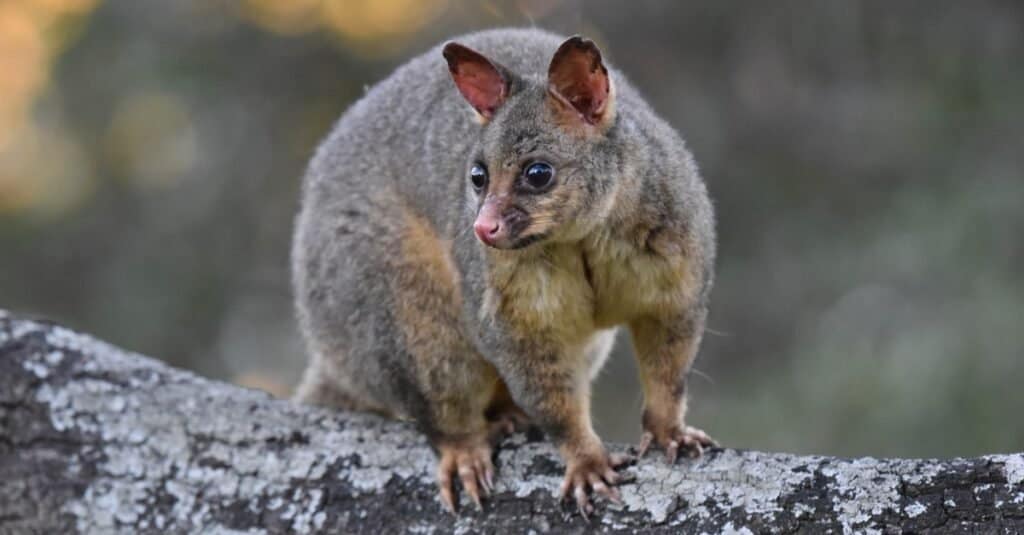
Only 4 species of possums hibernate, all of them pygmy possums.
©Timothy Christianto/Shutterstock.com
What is Hibernation?
Hibernation is a low-activity state designed to help animals conserve energy. It most often occurs in winter, though it may also occur at other times. Inadequate food is a common trigger as are plummeting temperatures. Not all animals hibernate, while those that do may hibernate at different times of the year. Prior to hibernation, animals like grizzly bears and groundhogs increase their food consumption. This is to build up fat stores to last them through the winter.
During hibernation, animals greatly decrease their metabolic activity, entering a state of metabolic depression. This involves slowing their heart rates, breathing, and body temperatures. Most animals leave hibernation when temperatures begin to climb, signalling to their bodies that it’s time to wake up and resume normal activity. Upon coming out of hibernation, the animal will typically imbibe large quantities of food to make up for a winter without nutrition.
Some people confuse the term “torpor” with hibernation. Torpor is a similar state wherein animals lower their metabolism and conserve energy, but it is typically only a daily or very short-term process. By contrast, hibernation lasts from several days to several months. Scientists sometimes use the term “extended torpor” or “prolonged torpor” to refer to hibernation.
Do Possums Hibernate in Winter?
Some possum species hibernate in winter while most others do not. Possums are marsupials from Australia and the surrounding islands. Despite popular misconception, they are different from opossums, which live in North and South America. The two are related; however, the terms are not interchangeable.
There are 69 different species of possums living on the continent of Australia. These include:
- Common Brushtail Possum (Trichosurus vulpecula)
- Common Ringtail Possum (Pseudocheirus peregrinus)
- Mountain Pygmy Possum (Burramys parvus)
- Honey Possum (Tarsipes rostratus)
- Scaly-Tailed Possum (Wyulda squamicaudata)
Of the 69 species, only 4 actually hibernate in winter. All are pygmy possums, including the mountain pygmy possum and the eastern pygmy possum. Other possum species engage in torpor rather than true hibernation. These species include the honey possum and the sugar glider possum. During torpor, possums typically eat and engage in other normal activities at certain points during the day. During hibernation, they rarely if ever consume food.
When Do Possums Hibernate?
Possums typically hibernate during the colder seasons in Australia and the surrounding islands. They enter once temperatures begin dropping and don’t emerge until it warms up again. The ideal temperature of the mountain pygmy possum’s hiding place is between 1.5°C to 2.5°C. Body temperature drops by several degrees.
How Do Possums Prepare for Hibernation?
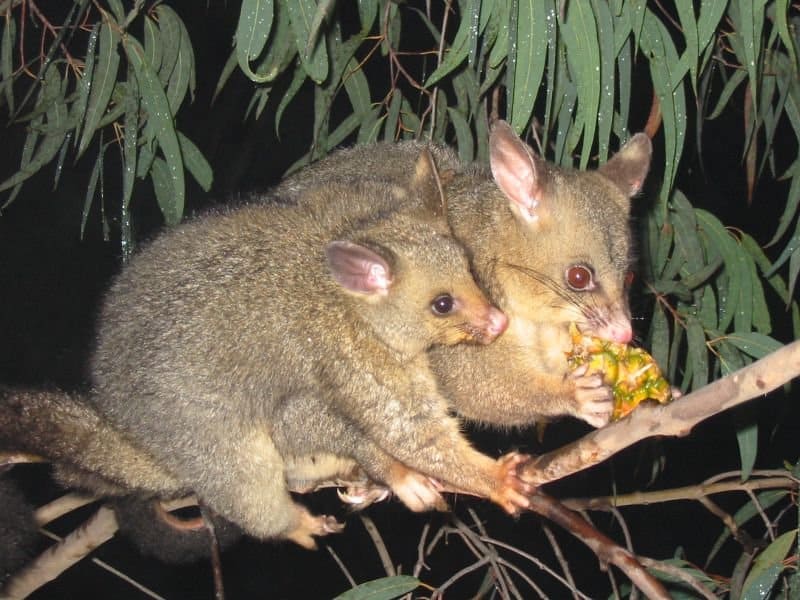
Possums prepare for hibernation by increasing their food consumption.
©Peter Firminger / CC BY 2.0, Flickr – License
Possums prepare for hibernation by increasing their food consumption and choosing an appropriate place to spend their time “sleeping.” Eating more food than usual is essential to build up fat stores for the extended period of torpor ahead. Coming out of sleep mid-hibernation is not ideal and can lead to death. With enough fat and nutrients in the possum’s system, it can survive for weeks or even months without waking up to refuel.
Possums also need to choose the best possible location to sleep. Firstly, they require a relatively warm space to keep from freezing to death when their body temperature plummets. This means finding the materials that provide good insulation. Secondly, hibernating possums are extremely vulnerable to attacks from predators. Tiger quolls, foxes, snakes, owls, dingoes, and cats all prey on possums. Choosing an optimal hiding place keeps them out of sight. See below for a description of where possums hibernate.
Where Do Possums Hibernate?
Possums typically hibernate under rock piles as deep as 2-4 metres under the snow. The rocks absorb heat from the sun, helping to keep the temperature livable while the possum remains in the state of torpor. Once the snow falls, it covers the rocks and increases their insulating properties. This is essential. Without this double layer of insulation, the cold may become too harsh and wake the possum prematurely, leaving it in danger of hypothermia and starvation.
These rock piles also make it harder for predators to find and root out the possum. Even a thin barrier between it and death may be vital in allowing it to wake up and escape in time.
What Do Possums Do During Hibernation?
During hibernation, possums mainly sleep. Some may wake periodically to eat, especially if the temperatures grow warm or cold enough to disturb them. However, this is rare and generally undesirable. For possums to survive in cold temperatures without food, they require the temperature to remain fairly constant.
How Long Do Possums Hibernate?
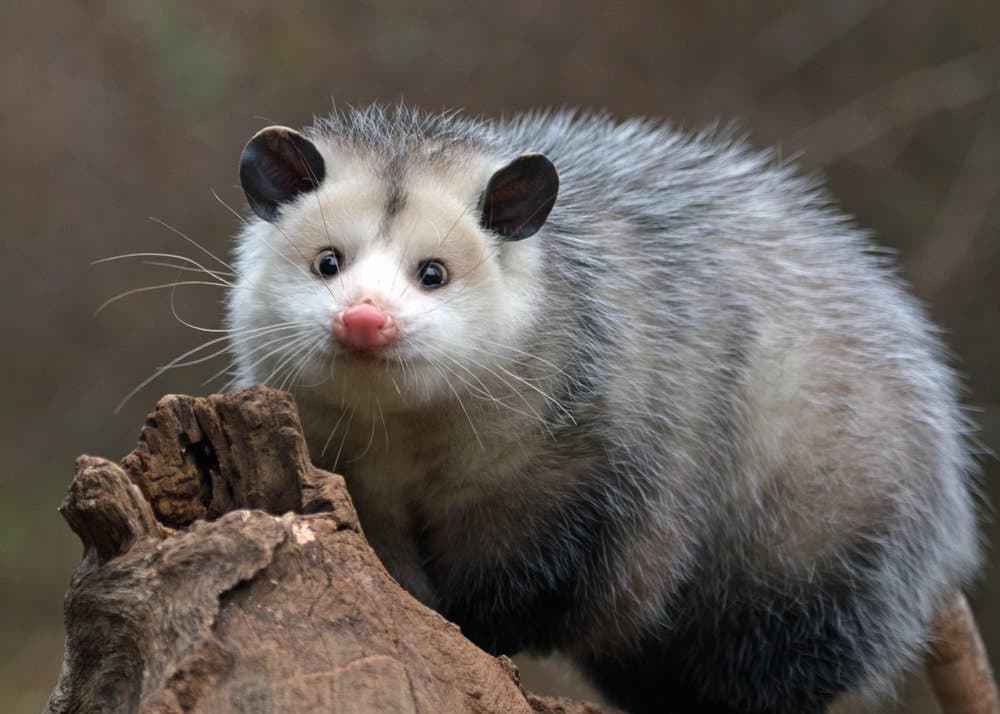
Possums hibernate for as long as seven months to a year.
©Lisa Hagan/Shutterstock.com
Possums may hibernate anywhere from several days to several weeks to several months. Mountain pygmy possums, for example, hibernate for up to 7 months at a time. The eastern pygmy possum, however, hibernates for a longer period than any other mammal on earth, staying under as long as one year!
External temperatures usually dictate the length of hibernation; warmer temperatures signal the renewal of food sources and livable conditions. For this reason, most animals, including possums, usually hibernate during the cold winter months. They then wake in spring.
How Can You Tell If a Possum is Hibernating?
Hibernating possums appear to be deeply asleep, perhaps even dead. They curl into a ball to preserve as much body heat as possible. Humans will rarely have the chance to observe a hibernating possum in the wild as they hide themselves away thoroughly.
Though possums may appear cute and cuddly while hibernating, it’s an incredibly serious matter for them. Hibernation allows some species of possums in Australia to survive what might otherwise be unmanageable conditions.
The photo featured at the top of this post is © Bryce McQuillan, CC BY-SA 2.0, via Wikimedia Commons – License / Original
FAQs (Frequently Asked Questions)
Do possums hibernate?
Some possum species hibernate in winter while most others do not. Possums are marsupials from Australia and the surrounding islands. Despite popular misconception, they are different from opossums, which live in North and South America.
What does a possum look like when it is hibernating?
Hibernating possums appear to be deeply asleep, perhaps even dead. They curl into a ball to preserve as much body heat as possible. Humans will rarely have the chance to observe a hibernating possum in the wild as they hide themselves away thoroughly.
Thank you for reading! Have some feedback for us? Contact the AZ Animals editorial team.



